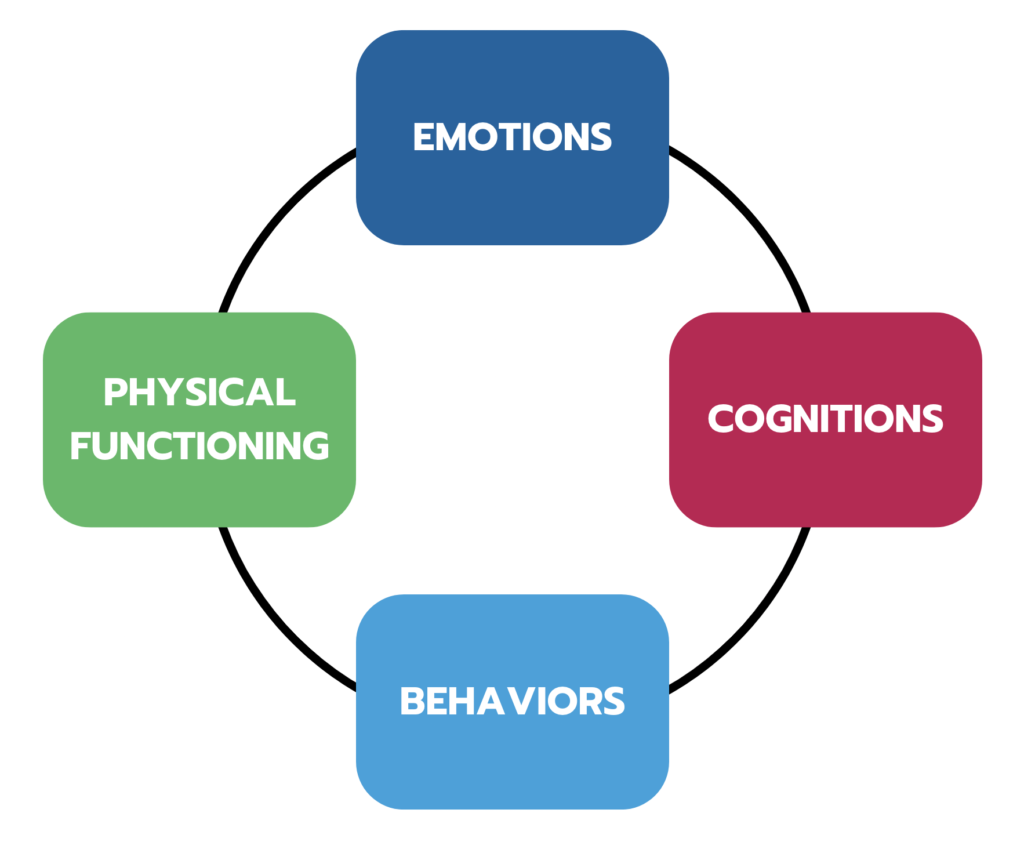Why implement CF-CBT at your CF center?
- Rates of depression and anxiety in people with CF are two to three times higher than in the general population.3
- Untreated depression, in particular, is associated with negative health outcomes, including worse health-related quality of life (HRQoL), lung function and increased mortality risk.4
- Providing an evidence-based mental health intervention tailored to CF-specific needs may improve outcomes for adults with CF.
What is CF-CBT?
- An 8-session mental health intervention developed with the CF community to promote emotional well-being and prevent and treat depression and anxiety
- Delivered by a trained member of the CF care team
- Integrated into routine CF care to improve access to evidence-based mental health intervention
- Available in English and Spanish
What is the evidence for CF-CBT?
- Cognitive-behavioral therapy is a brief, structured mental health intervention with an established evidence-base for treating depression and anxiety and improving HRQoL in medical populations.5,6
- A multi-center waitlist-controlled randomized controlled trial of CF-CBT confirmed feasibility and acceptability and demonstrated significant improvement in self-efficacy in coping with the challenges of living with CF. 7
- Coping self-efficacy is associated with successful outcomes of mental health interventions including long-term improvement in anxiety and depression as well as improved quality of life and positive health outcomes in chronic illness populations.
How can we get started?
- The mental health coordinator or another CF care team member who will be conducting the program with adult patients at your CF center must first be trained in how to deliver the program.
- A virtual live training with CE/CME credits will be offered on February 7, 2024 and March 5, 2024 from 11 AM to 7 PM Eastern Time. Additional opportunities for training will be announced as they become available.
- The next step is to obtain a free license to use the materials at your center. The CF-CBT Intervention Manual for providers and Patient Workbook are owned by Massachusetts General Hospital (MGH).
- To obtain a license, please contact _________
Who is appropriate for a referral? Adults with CF who…
- report any stress e.g., challenges managing daily CF care, work/ family life balance, financial stress
- report life changes or transitions (either positive or negative) e.g., change in employment, school transitions, relationship status, new health issue, recently referred for transplant or have received a transplant
- are presenting differently, don’t seem like themselves- e.g., typically cheerful and talkative, but now seem sad or worried
- you know may be on a waiting list for a therapist
- you know by screening have symptoms of depression and/ or anxiety (NOTE: if any concerns about severe depression/ anxiety or safety concerns, refer to the appropriate team member for further
- feeling down or irritable
- changes in sleeping, eating or energy
- more worry or trouble relaxing
Citations
- Friedman D, Kaskas MM, Quittner AL, Smith BA, Georgiopoulos AM. Patient engagement in the development of CF-CBT: A cystic fibrosis-specific cognitive-behavioral intervention for adults. Front Psychol. 2022 Oct 7;13:937189.
- Friedman D, Smith BA, Bruce A, et al. Feasibility and acceptability of a CF-specific cognitive-behavioral preventive intervention for adults integrated into team-based care. Pediatr Pulmonol. 2022 Nov;57(11):2781-2790.
- Quittner AL, Goldbeck L, Abbott J, et al. Prevalence of depression and anxiety in patients with cystic fibrosis and parent caregivers: results of The International Depression Epidemiological Study across nine countries. Thorax. 2014 Dec;69(12):1090-7.
- Schechter MS, Ostrenga JS, Fink AK, et al. Decreased survival in cystic fibrosis patients with a positive screen for depression. J Cyst Fibros. 2021;20(1):120–126.
- Butler AC, Chapman JE, Forman EM, Beck AT. The empirical status of cognitive behavioral therapy: a review of meta-analyses. Clin Psychol Rev. 2006 Jan;26(1):17-31.
- Reavell J, Hopkinson M, Clarkesmith D, Lane DA. Effectiveness of Cognitive Behavioral Therapy for Depression and Anxiety in Patients with Cardiovascular Disease. Psychosom Med. 2018;80(8):742–753.
- Friedman D, Smith B, Sher Y, et al. Outcomes of a randomized controlled trial of CF-CBT in adults with cystic fibrosis with mild depression and anxiety. J Cyst Fibros. 22:S243-S244.
- Philip EJ, Merluzzi TV, Zhang Z, Heitzmann CA. Depression and cancer survivorship: importance of coping self-efficacy in post-treatment survivors. Psychooncology. 2013. 22(5):987-94. doi: 10.1002/pon.3088.



